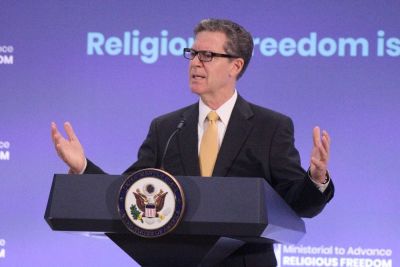Why it’s important to celebrate Religious Freedom Day

In 1788, the principle of religious freedom was so unifying that our Founders included it in the First Amendment to the newly ratified U.S. Constitution. The Founders took care to ensure this freedom was among the first freedoms guaranteed in our new nation, that has been “a city upon a hill” long since.
But sadly, the term “religious freedom” garners great animosity from some in our postmodern era. Two months ago, a prominent news outlet ran a headline explicitly calling religious freedom “poisonous, anti-LGBTQ bigotry.” Other journalists and politicians regularly make similar statements. But this perspective on religious freedom was not shared by our Founders. And until fairly recently, it also wasn’t shared by politicians on either side of the aisle.
In 1993, President Bill Clinton began the annual tradition of proclaiming today, Jan. 16, as “Religious Freedom Day.” It was that same year that Congressman Chuck Schumer— now the Democratic Senate Minority Leader — introduced the Religious Freedom Restoration Act, which passed Congress with a nearly unanimous vote.
RFRA was passed largely in response to the U.S. Supreme Court’s decision in Employment Division v. Smith, which has its 20th anniversary later this year. In Smith, the court ruled that a state could deny unemployment benefits to a Native American worker who was fired for his sacramental use of peyote, an illegal drug. More fundamentally, the court held that the First Amendment does not protect an individual’s religious exercise if it violates a generally applicable law.
Americans with various religious backgrounds on both sides of the aisle recognized that Smith threatened everyone’s religious freedom. The decision has also been criticized by a diverse set of political and legal organizations, including left-leaning groups such as the ACLU. Observing this consensus, legal scholars have remarked that Smith has “been criticized by every side.” That’s one reason why only three members of Congress voted against its passage in 1993.
After the Smith ruling, Christians bravely led much of the effort to pass RFRA through Congress, in addition to many successful efforts to pass RFRA laws at the state level. These Christians, and the rest of the broad coalition that formed in opposition to Smith, understood that protecting religious freedom benefits everyone. Americans of all political stripes agreed that the government should not restrict religious expression or compelling people to act contrary to their faith.
Thomas Jefferson understood this principle well. It was on this day in 1786 that his proposed Virginia Statute for Religious Freedom was enacted. That statute ensured “that no man shall be compelled to frequent or support any religious worship, place, or ministry whatsoever.” In other words, government could not force citizens to support a different religion or church through attendance or taxation.
We take this freedom for granted today, but in Jefferson’s time, it was a revolutionary idea. And without this revolutionary idea within the seed of the American founding, our country never would have grown into the diverse world power it is today.
Critics of religion frequently fail to recognize that religious freedom is what has allowed the American experiment to be so successful. Throughout world history, such a diverse group of people from so many ethnic and religious backgrounds has never lived together in peace and harmony as they have in America. This did not happen by accident or happenstance. Societies that safeguard religious freedom stimulate a culture in which people learn from their differences, respect those differences, and ultimately treasure them. America was the first nation to protect this freedom from its founding. And the result proves its value. As the Gospel tells us, “By their fruits ye shall know them” (Matthew 7:20).
As a Christian, I may not understand why the Native Americans in Smith believed peyote was necessary for their religious ceremonies. And others may not understand why Christians like myself (as well as Jews, Muslims, and others) believe in the traditional view of marriage. But on Religious Freedom Day, all Americans can recognize that these differences of opinion can be held peacefully, without hostility, and we can recognize that the government has no right to force people to express messages that conflict with their religious beliefs, or to restrict people from peacefully exercising their religion.
Religious freedom gives you the right to honor God as you please. And that’s freedom everyone should celebrate.
Ryan Everson is a communication integrity specialist with Alliance Defending Freedom (@AllianceDefends), an alliance-building, non-profit legal organization that advocates for the right of people to freely live out their faith.




























